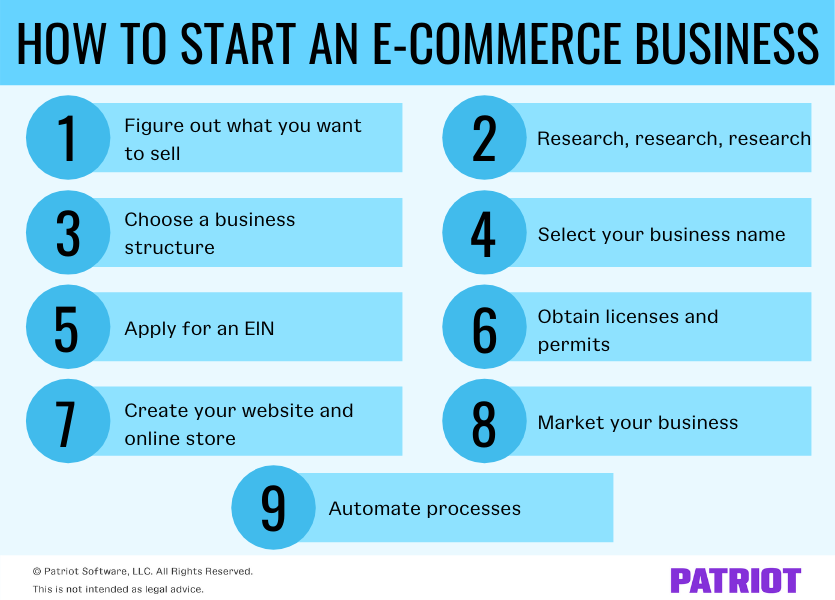Thanks to the evolution of technology, you can run your business all behind a computer screen nowadays. If you like the idea of running a business online, then an e-commerce business might be a good fit for you. Read on to learn how to start an e-commerce business and tips for successfully building an online business.
E-commerce overview
Before you learn all about how to start an ecommerce business, you need to know what it is. So without further ado, what exactly is e-commerce? E-commerce, or electronic commerce, is where transactions take place via the internet. With e-commerce, businesses can sell products or services online.
E-commerce transactions can occur over:
- Computers
- Tablets
- Smartphones
There are many advantages to starting an e-commerce business. Selling products and services online is not only convenient, but also cost-effective. With an online store, you might decide you don’t need to rent out a brick and mortar location. Plus, you can save money on things like utilities and maintenance. Additionally, with an e-commerce business, it’s easier to reach more customers and expand as a company.
How to start an e-commerce business in 9 steps
Thinking about starting an e-commerce store, eh? Awesome! To get started, follow the nine steps below.
1. Figure out what you want to sell
Before you run off and build your online business, you have to determine what you’re going to sell. Seems simple enough, right? Wrong. Coming up with what you’re going to offer to customers isn’t as easy as it might sound.
If you haven’t already, pinpoint what products or services you want to sell. Once you determine what you want to sell online, you can…
2. Research, research, research
Researching is one of the most important parts of starting any type of business. Your research can dictate the decisions you make and the direction you take. With good research, you can build a solid foundation for your e-commerce business. But with bad research, you could wind up targeting the wrong market, making a bunch of blunders, etc.
When you’re building an e-commerce business, you’ll need to research:
- The competition
- The market
- Business models (e.g., subscription service, wholesaling, etc.)
- Potential suppliers
- Costs
- E-commerce laws and regulations (e.g., economic nexus)
Yes, researching can be time consuming. However, it’s absolutely necessary if you want your business to succeed in the long-term. Plus, it will help you write and build your e-commerce small business plan.
3. Choose a business structure
There are a few types of business structures you can choose from when starting a business. But when it comes to a business structure for an e-commerce company, there are a few structures that are more suitable.
The most popular business structures for e-commerce businesses include:
- Sole proprietorship
- Limited liability company (LLC)
- General partnership
Keep in mind that, in most cases, you’re not limited to the type of business structure you select. However, in some states, e-commerce businesses may not be able to use a certain structure. For example, some states don’t allow e-commerce merchants to have a limited liability partnership.
Before you choose a business structure, do your research, weigh the pros and cons of each, and check with your state to find out what structures you can and cannot use.
4. Select your business name
One of the biggest responsibilities you have when starting your online business is selecting your business name. Your company name can be your business’s most valuable asset. So, it needs to nail the landing. No pressure, right?
When picking out a business name, try to keep it short and simple. The easier it is to memorize and pronounce, the easier it will be for people to find your business online. Also, dare to be different and don’t be afraid to get creative. You can have a business name that’s easy to memorize and unique at the same time.
Once you get the creative juices flowing and find a business name that aligns with your company and mission, remember to do your homework to ensure the name is not already taken. You can find out whether the name is available by Googling it, running a trademark search, and looking at domain names.
After you determine the perfect name for your e-commerce business, register your name with the state. In some cases, like with corporations, you register your name when filing documents to form the business.
5. Apply for an EIN
Even if you don’t plan on employing any workers, you’ll need to apply for an Employer Identification Number, or EIN, to do things like open a business bank account and file your business taxes.
An EIN is a nine-digit number that the IRS assigns to businesses. Your EIN helps identify your business and is like a Social Security number for your company. You can apply for an EIN with the IRS online, via fax, or through the mail.
In addition to applying for an EIN, you may also need to apply for the following:
- Federal tax ID number
- Business tax ID number (e.g., permits)
- State tax ID number
- Local tax ID number
6. Obtain licenses and permits
Depending on what your business does, you may need to also obtain certain business licenses and permits.
Licenses and permits allow you to operate your business and perform certain functions, such as collecting sales tax. Apply for and obtain the proper business permits and licenses to legally operate your e-commerce business.
Some types of licenses and permits you may need to get include a sales tax permit, business license, resale permit, or professional license.
7. Create your website and online store
Now onto the fun part: designing and creating your website and online store. Your website will be the face of your e-commerce business. It’s what all of your potential customers will see. So, it’s important to make sure your website is on-brand, easy-to-navigate, and well-designed.
As you develop your online store, think about things like domain name, user experience, design, and color palette. You’ll want to make sure that your domain name closely matches the business name you’ve selected. Your design, colors, business logo, and images should align with your business and your brand.
If you’re like most business owners, you’re probably not an expert in website design. To make your e-commerce business vision come to life, hire a web designer or expert.
In addition to hiring a web designer, you may want to hire a search engine optimization specialist to help make sure your website is easy-to-find and SEO-friendly. Consider brushing up on SEO best practices so you can thoroughly understand how to optimize your website and pages, too.
8. Market your business
To attract potential customers to your business website, you need to do much more than just SEO. You must also advertise your business and market to your customers.
There are a number of ways you can market your e-commerce business. Here are just a few:
- Spread the word on social media
- Utilize pay-per-click (PPC) advertising
- Sell on multiple channels (e.g., Amazon, eBay, etc.)
- Start a blog
- Send out email campaigns
- Ask current customers to leave online reviews
9. Automate processes
As a business owner, you’re going to have a lot on your plate when it comes to finances and taxes. To help keep your finances in order and your accounting books accurate and up-to-date, consider automating your accounting process.
Instead of doing your accounting by hand or hiring a bookkeeper, consider investing in accounting software. Software can help you keep your books organized and track income and expenses.
In addition to automating your accounting, you may also want to automate other tasks, such as emailing customers, posting on social media, and paying bills.

Tips for building a successful e-commerce business
Want your e-commerce business to be wildly successful? Who doesn’t? To help your e-commerce thrive for many years, check out these tips:
- Don’t rush the process (aka take your time while starting your e-commerce business)
- Put yourself in your potential customers’ shoes
- Test as much as you possibly can
- Stay on top of search engine optimization (SEO)
- Keep mobile in mind (e.g., smartphones, tablets, etc.)
- Focus on user experience
- Utilize social media to your advantage
- Track analytics to see where you stand and set goals
Keep in mind it takes time to start any type of business, online or not. When building your e-commerce business, don’t be afraid to try new things, take risks, and show your customers who you truly are (they will appreciate the transparency).
Looking for an easy way to track your e-commerce business transactions? Patriot’s online accounting lets you streamline the way you record your income and expenses. Plus, we offer free, USA-based support. Try it for free today!
This is not intended as legal advice; for more information, please click here.




